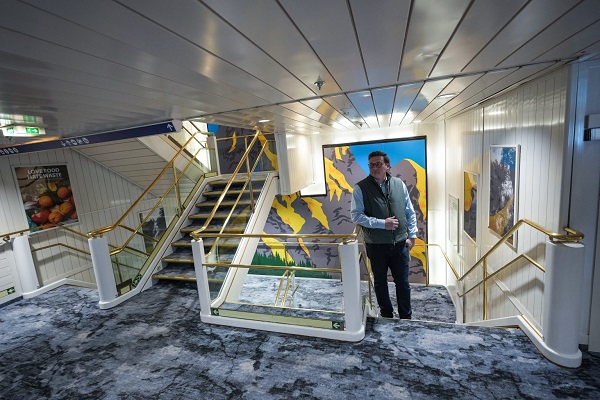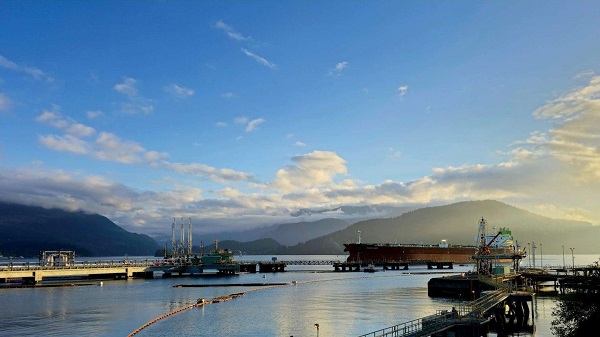Uncategorized
Florida man charged after weeklong bomb-package scare

WASHINGTON — A Florida man with a long criminal history was charged Friday in the nationwide mail-bomb scare targeting prominent Democrats who have traded criticism with President Donald Trump. It was a first break in a case that has seized the national conversation and spread fear of election-season violence with little precedent in the U.S.
Justice Department officials revealed that a latent fingerprint found on one package helped them identify their suspect as Cesar Sayoc, 56, of Aventura, Florida. The criminal complaint charges Sayoc with illegally mailing explosives, illegally transporting explosives across state lines, making threats against former presidents, assaulting federal officers and threatening interstate commerce.
Court records show Sayoc, an amateur body builder with social media accounts that denigrate Democrats and praise Trump, has a history of arrests for theft, illegal steroids possession and a 2002 charge of making a bomb threat.
The development came amid a nationwide manhunt for the person responsible for at least 13 explosive devices addressed to prominent Democrats including former President Barack Obama, former
In Washington, Attorney General Jeff Sessions cautioned that Sayoc had only been charged, not convicted. But he said, “Let this be a lesson to anyone regardless of their political beliefs that we will bring the full force of law against anyone who attempts to use threats, intimidation and outright violence to further an agenda. We will find you, we will prosecute you to the fullest extent of the law.”
In Florida, law enforcement officers were seen on television examining a white van, its windows covered with an assortment of stickers, outside the Plantation auto parts store. Authorities covered the vehicle with a blue tarp and took it away on the back of a flatbed truck.
The stickers included images of Trump, American flags and what appeared to be logos of the Republican National Committee and CNN, though the writing surrounding those images was unclear.
Trump, after Sayoc was apprehended, declared that “we must never allow political violence take root in America” and Americans “must unify.” As in comments earlier in the week, he did not mention that the package recipients were all Democrats or officials in Obama’s administration, in addition to CNN, a news network he criticizes almost daily.
Earlier Friday, he complained that “this ‘bomb’ stuff” was taking attention away from the upcoming election and said critics were wrongly blaming him and his heated rhetoric.
The Justice Department scheduled a Friday afternoon news conference in Washington that was to include New York Police Commissioner James O’Neill, whose department investigated the mailings with the FBI.
Law enforcement officials said they had intercepted a dozen packages in states across the country. None had exploded, and it wasn’t immediately clear if they were intended to cause physical harm or simply sow fear and anxiety.
Earlier Friday, authorities said suspicious packages addressed to New Jersey Sen. Cory Booker and former National Intelligence Director James Clapper — both similar to those containing pipe bombs sent to other prominent critics of Trump— had been intercepted.
Investigators believe the mailings were staggered. The U.S. Postal Service searched their facilities 48 hours ago and the most recent packages didn’t turn up. Officials don’t think they were sitting in the system without being spotted. They were working to determine for sure. The officials spoke to The Associated Press on condition of anonymity to discuss an ongoing investigation.
Online court records show that Sayoc in 2002 was arrested and served a year of probation for a felony charge of threatening to throw or place a bomb. No further details were available about the case.
Sayoc was convicted in 2014 for grand theft and
He filed for chapter 7 bankruptcy in 2012, informing the court he had $4,175 in personal property and more than $21,000 in debts. His name is also listed on business records tied to dry cleaning and catering businesses. Records show he was born in New York and according to an online resume he attended college in North Carolina.
“Debtor lives with mother, owns no furniture,” Sayoc’s lawyer indicated in a property list.
Investigators were analyzing the innards of the crude devices to reveal whether they were intended to detonate or simply sow fear just before Election Day.
Law enforcement officials told The Associated Press that the devices, containing timers and batteries, were not rigged to explode upon opening. But they were uncertain whether the devices were poorly designed or never intended to cause physical harm.
Most of those targeted were past or present U.S. officials, but one was sent to actor Robert De Niro and billionaire George Soros. The bombs have been sent across the country – from New York, Delaware and Washington, D.C., to Florida and California, where Rep. Maxine Waters was targeted. They bore the return address of Florida Rep. Debbie Wasserman Schultz, the former chairwoman of the Democratic National Committee.
The common thread among the bomb targets was obvious: their critical words for Trump and his frequent, harsher criticism in return.
The package to Clapper was addressed to him at CNN’s Midtown Manhattan address. Clapper, a frequent Trump critic, told CNN that he was not surprised he was targeted and that he considered the actions “definitely domestic terrorism.”
The devices were packaged in manila envelopes and carried U.S. postage stamps. They were being examined by technicians at the FBI’s forensic lab in Quantico, Virginia.
The packages stoked nationwide tensions ahead of the Nov. 6 election to determine control of Congress — a campaign both major political parties have described in near-apocalyptic terms. Politicians from both parties used the threats to decry a toxic political climate and lay blame.
The bombs are about 6 inches (15
The first bomb discovered was delivered Monday to the suburban New York compound of Soros, a major contributor to Democratic causes. Soros has called Trump’s presidency “dangerous.”
___
Associated Press writers Laurie Kellman, Ken Thomas, Jill Colvin and Chad Day in Washington and Jim Mustian, Deepti Hajela, Tom Hays and Michael R. Sisak in New York contributed to this report.
___
For the AP’s complete coverage of the mail-bomb scare: https://apnews.com/PipeBombAttacks
Michael Balsamo, Eric Tucker And Colleen Long, The Associated Press
Uncategorized
Cost of bureaucracy balloons 80 per cent in 10 years: Public Accounts

The cost of the bureaucracy increased by $6 billion last year, according to newly released numbers in Public Accounts disclosures. The Canadian Taxpayers Federation is calling on Prime Minister Mark Carney to immediately shrink the bureaucracy.
“The Public Accounts show the cost of the federal bureaucracy is out of control,” said Franco Terrazzano, CTF Federal Director. “Tinkering around the edges won’t cut it, Carney needs to take urgent action to shrink the bloated federal bureaucracy.”
The federal bureaucracy cost taxpayers $71.4 billion in 2024-25, according to the Public Accounts. The cost of the federal bureaucracy increased by $6 billion, or more than nine per cent, over the last year.
The federal bureaucracy cost taxpayers $39.6 billion in 2015-16, according to the Public Accounts. That means the cost of the federal bureaucracy increased 80 per cent over the last 10 years. The government added 99,000 extra bureaucrats between 2015-16 and 2024-25.
Half of Canadians say federal services have gotten worse since 2016, despite the massive increase in the federal bureaucracy, according to a Leger poll.
Not only has the size of the bureaucracy increased, the cost of consultants, contractors and outsourcing has increased as well. The government spent $23.1 billion on “professional and special services” last year, according to the Public Accounts. That’s an 11 per cent increase over the previous year. The government’s spending on professional and special services more than doubled since 2015-16.
“Taxpayers should not be paying way more for in-house government bureaucrats and way more for outside help,” Terrazzano said. “Mere promises to find minor savings in the federal bureaucracy won’t fix Canada’s finances.
“Taxpayers need Carney to take urgent action and significantly cut the number of bureaucrats now.”
Table: Cost of bureaucracy and professional and special services, Public Accounts
| Year | Bureaucracy | Professional and special services |
|
$71,369,677,000 |
$23,145,218,000 |
|
|
$65,326,643,000 |
$20,771,477,000 |
|
|
$56,467,851,000 |
$18,591,373,000 |
|
|
$60,676,243,000 |
$17,511,078,000 |
|
|
$52,984,272,000 |
$14,720,455,000 |
|
|
$46,349,166,000 |
$13,334,341,000 |
|
|
$46,131,628,000 |
$12,940,395,000 |
|
|
$45,262,821,000 |
$12,950,619,000 |
|
|
$38,909,594,000 |
$11,910,257,000 |
|
|
$39,616,656,000 |
$11,082,974,000 |
Uncategorized
Trump Admin Establishing Council To Make Buildings Beautiful Again


From the Daily Caller News Foundation
By Jason Hopkins
The Trump administration is creating a first-of-its-kind task force aimed at ushering in a new “Golden Age” of beautiful infrastructure across the U.S.
The Department of Transportation (DOT) will announce the establishment of the Beautifying Transportation Infrastructure Council (BTIC) on Thursday, the Daily Caller News Foundation exclusively learned. The BTIC seeks to advise Transportation Secretary Sean Duffy on design and policy ideas for key infrastructure projects, including highways, bridges and transit hubs.
“What happened to our country’s proud tradition of building great, big, beautiful things?” Duffy said in a statement shared with the DCNF. “It’s time the design for America’s latest infrastructure projects reflects our nation’s strength, pride, and promise.”
“We’re engaging the best and brightest minds in architectural design and engineering to make beautiful structures that move you and bring about a new Golden Age of Transportation,” Duffy continued.
Mini scoop – here is the DOT’s rollout of its Beautifying Transportation Infrastructure Council, which will be tasked with making our buildings beautiful again. pic.twitter.com/
9iV2xSxdJM — Jason Hopkins (@jasonhopkinsdc) October 23, 2025
The DOT is encouraging nominations of the country’s best architects, urban planners, artists and others to serve on the council, according to the department. While ensuring that efficiency and safety remain a top priority, the BTIC will provide guidance on projects that “enhance” public areas and develop aesthetic performance metrics.
The new council aligns with an executive order signed by President Donald Trump in August 2025 regarding infrastructure. The “Making Federal Architecture Beautiful Again” order calls for federal public buildings in the country to “respect regional architectural heritage” and aims to prevent federal construction projects from using modernist and brutalist architecture styles, instead returning to a classical style.
“The Founders, in line with great societies before them, attached great importance to Federal civic architecture,” Trump’s order stated. “They wanted America’s public buildings to inspire the American people and encourage civic virtue.”
“President George Washington and Secretary of State Thomas Jefferson consciously modeled the most important buildings in Washington, D.C., on the classical architecture of ancient Athens and Rome,” the order continued. “Because of their proven ability to meet these requirements, classical and traditional architecture are preferred modes of architectural design.”
The DOT invested millions in major infrastructure projects since Trump’s return to the White House. Duffy announced in August a $43 million transformation initiative of the New York Penn Station in New York City and in September unveiledmajor progress in the rehabilitation and modernization of Washington Union Station in Washington, D.C.
The BTIC will comprise up to 11 members who will serve two-year terms, with the chance to be reappointed, according to the DOT. The task force will meet biannually. The deadline for nominations will end Nov. 21.
-

 Energy2 days ago
Energy2 days agoA look inside the ‘floatel’ housing B.C.’s LNG workforce
-

 Economy1 day ago
Economy1 day agoWhat the Data Shows About the New Canada-Alberta Pipeline Opportunity
-

 illegal immigration1 day ago
illegal immigration1 day agoWhile Trump has southern border secure, hundreds of thousands of illegal immigrants still flooding in from Canada
-

 COVID-192 days ago
COVID-192 days agoUniversity of Colorado will pay $10 million to staff, students for trying to force them to take COVID shots
-

 Censorship Industrial Complex24 hours ago
Censorship Industrial Complex24 hours agoCanadian bishops condemn Liberal ‘hate speech’ proposal that could criminalize quoting Scripture
-

 Business2 days ago
Business2 days agoOil tanker traffic surges but spills stay at zero after Trans Mountain Expansion
-

 COVID-192 days ago
COVID-192 days agoCanadian legislator introduces bill to establish ‘Freedom Convoy Recognition Day’ as a holiday
-

 Energy14 hours ago
Energy14 hours agoSenate votes to reopen Alaska Coastal Plain to energy leasing










